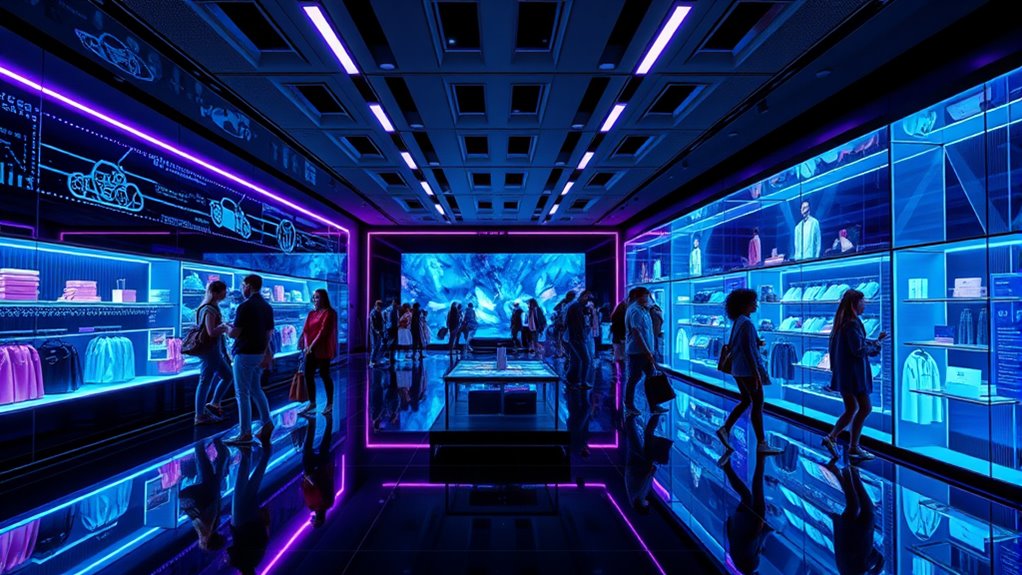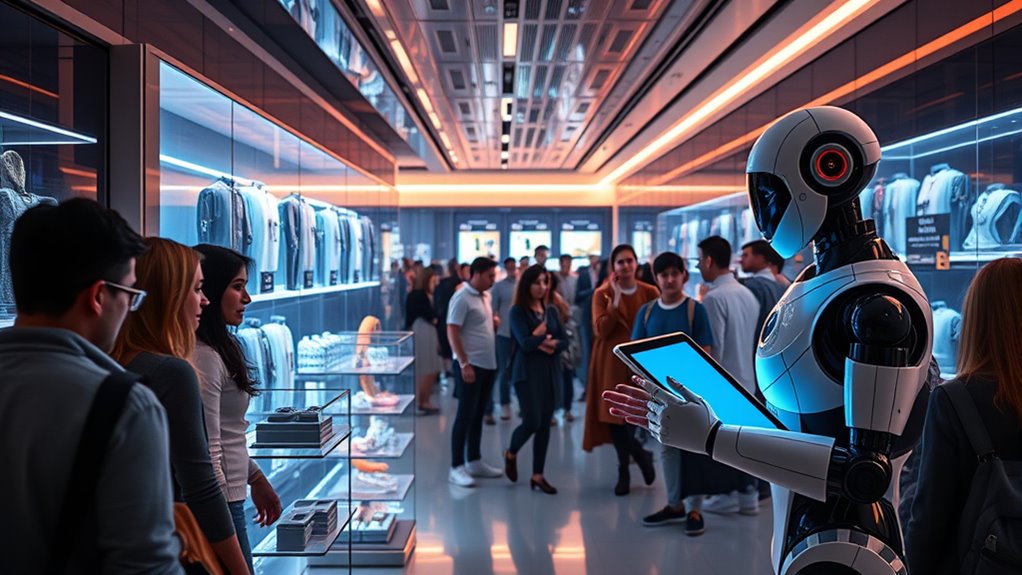Generative commerce is the next trillion-dollar frontier because it harnesses advanced AI to create hyper-personalized shopping experiences at scale, boosting engagement and conversions. It automates tasks like product descriptions, marketing content, and visualizations, saving time and increasing efficiency. By continuously learning customer preferences, it fosters stronger loyalty and trust. As this tech evolves, it promises transformative growth for retailers willing to embrace automation and innovation—stay tuned to discover how you can benefit from these changes.
Key Takeaways
- Enables hyper-personalized marketing and product experiences at scale, boosting customer engagement and conversion rates.
- Automates content creation and customer interactions, increasing operational efficiency and reducing costs.
- Facilitates rapid response to market trends and customer insights through continuous AI learning.
- Enhances immersive shopping through text-to-image visualization, driving innovative retail experiences.
- Supports sustainable growth with energy-efficient AI infrastructure, aligning profitability with environmental responsibility.

Have you ever wondered how brands deliver highly personalized shopping experiences so seamlessly? The answer lies in generative commerce, a revolutionary approach powered by generative artificial intelligence (GenAI). This technology uses advanced machine learning models, including large language models (LLMs) and text-to-image generators, to craft tailored content, marketing messages, and customer interactions in real time. Foundation models, which learn from vast data patterns, enable GenAI to generate contextually relevant outputs based on user prompts. Technologies like ChatGPT for conversations and DALL-E or Stable Diffusion for visual content have accelerated capabilities, especially since the rise of transformer-based neural networks in the 2020s. These developments allow brands to engage consumers at a personalized level that was previously impossible. Generative AI models are trained on enormous datasets, enabling them to produce highly accurate and relevant content across various domains. With generative commerce, you can expect hyper-personalization at scale. Retailers now automate product descriptions, marketing messages, and personalized offers that adapt to individual preferences. For example, AI-powered chatbots create natural language conversations, helping you discover products and make purchasing decisions effortlessly. Over time, these AI systems learn your brand voice and preferences, refining recommendations and boosting engagement. Stitch Fix, for instance, uses text-to-image generation to visualize apparel based on your style choices, making your shopping experience more immersive. The ability of GenAI to facilitate human-like interactions means brands can cross-sell and upsell relevant products, fostering loyalty and trust. Additionally, advancements in Wind turbine technology contribute to the sustainability of energy sources powering data centers and AI infrastructure, ensuring environmentally responsible growth. Operationally, generative AI automates repetitive tasks like writing product descriptions, summarizing feedback, and designing marketing campaigns. This automation saves time and allows marketing and merchandising teams to focus on strategic, creative efforts. It also enables faster reactions to market trends and customer insights, as AI systems continuously improve with new data. For you, this means more personalized content delivered faster and more efficiently. In marketing and sales, generative commerce dramatically enhances productivity. AI drafts advertising content, headlines, slogans, and social media posts tailored to your interests. Personalized messaging increases your engagement and conversion rates because it resonates with your preferences. Marketers use AI to test concepts quickly through simulated consumer scenarios, gaining insights that help refine campaigns. As a result, brands can connect with customers more effectively, making generative commerce the next trillion-dollar frontier in retail.
Frequently Asked Questions
How Does Generative Commerce Differ From Traditional E-Commerce?
Generative commerce differs from traditional e-commerce by creating personalized content, recommendations, and marketing in real time. You’ll notice it tailors the entire shopping experience based on your browsing and purchase history, unlike static displays. It automates campaigns, generates dynamic visuals, and adjusts offers instantly. Its modular architecture allows seamless scaling, making your interactions more engaging, efficient, and responsive, ultimately boosting your satisfaction and loyalty.
What Industries Will Benefit Most From Generative Commerce?
You might be surprised, but industries like retail, fashion, and advertising stand to gain the most from generative commerce. Imagine hyper-personalized shopping experiences, faster product design, and automated marketing campaigns transforming your daily business. As AI-driven insights and creativity accelerate, you’ll find operational costs shrinking and customer loyalty soaring. These sectors are on the brink of a revolution, and embracing generative commerce now could put you ahead of the curve.
Are There Ethical Concerns With Generative Commerce?
Yes, there are ethical concerns with generative commerce. You need to be aware of privacy risks, as AI may collect and share personal data without consent, risking legal penalties. Bias and discrimination can also be embedded in AI-generated content, harming marginalized groups or misrepresenting communities. Additionally, copyright infringement and misinformation pose significant threats, and overreliance on AI can impact jobs and sustainability. Addressing these issues requires transparency, accountability, and responsible governance.
How Secure Is Data in Generative Commerce Platforms?
Your data in generative commerce platforms is like a delicate tapestry, vulnerable to unseen threats. While security measures like zero-trust strategies and AI-driven defenses strengthen your shield, risks still lurk—especially with increased data volumes and shadow IT. You must stay vigilant, implement real-time data loss prevention, and adapt quickly, because even the most secure fortress can be breached if you don’t continuously fortify it against evolving cyber threats.
What Skills Are Needed to Develop Generative Commerce Solutions?
You need a strong grasp of Python and deep learning frameworks like TensorFlow and PyTorch to develop generative commerce solutions. Understanding neural networks such as GANs and transformers is essential, along with skills in natural language processing and statistical analysis. Additionally, you should be familiar with software development lifecycle, API integration, version control, and industry-specific customization. Staying updated through continuous learning and relevant certifications helps you build innovative, secure, and scalable generative commerce systems.
Conclusion
As you step into the world of generative commerce, you’re on the cusp of unleashing incredible growth. This frontier offers endless possibilities, transforming how you create, personalize, and sell. Don’t forget, the early bird catches the worm, so seize the opportunity now. Embracing this innovation means you’re not just keeping up—you’re setting the pace for the future of business. Get ready to turn the tide in your favor and ride the wave of change.










